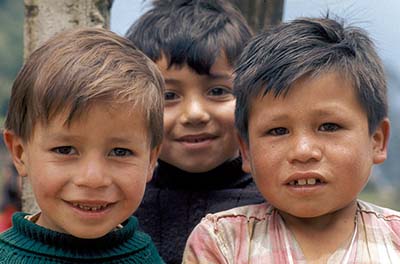Improved Early Childhood Care and Development Action Plans in La Paz and El Alto, Bolivia

Key Contact
Patricia Alvarez
Start Date
End Date
Funding Amount
$ 44,190
Topics
Knowledge-providing Countries
Knowledge-receiving Countries
Summary
Bolivia’s National Development Plan and Country Partnership Strategy identify the improvement of basic social services as one of the four development pillars for sustained economic growth. New Education and Popular Participation laws call for education services that consider the nation’s rich cultural diversity. The same laws assign control of education infrastructure to municipalities, with broader participation from local families and communities.
Under the new Country Partnership Strategy, Bolivia’s municipalities of La Paz and El Alto planned to undertake comprehensive policy reforms across the social sector, and design the inter-institutional architecture required to implement policies and deliver services more efficiently. La Paz and El Alto particularly wanted to improve early childhood education, health, nutrition, child protection, and quality assurance to enhance opportunities for children and reduce intergenerational poverty and inequality.
To this end, both municipal governments requested World Bank assistance to learn from other countries’ best practices for delivering quality early childhood development services. The knowledge gained would help officials prepare and design their own policies and program implementation strategies. The Bank identified Colombia as a suitable fit for the knowledge exchange.
The exchange connected officials from the Bolivian cities of La Paz and El Alto with counterparts from Bogotá and Medellin in Colombia. The main objective was to enhance service delivery for young children in Bolivia. The exchange consisted of a series of video training and webinars, the creation of a knowledge sharing network among policymakers, and the development of a comprehensive early childhood education action plan.
Evaluating the exchange after it was complete, the participants said that the exercise was “an eye opener” and that it “enabled the team to learn about differential services for children with special needs from an inclusive approach.” They added that “it was motivating to see examples of how [Colombia] has been able to overcome challenges that we also identify with.”
Overall, the exchange was effective in strengthening the capacity of the Ministry of Education and the municipalities of La Paz and El Alto to provide quality early childhood development services to the population. The exchange exposed technical staff members to innovative practices and enabled them to take charge of implementing the programs locally. As a result, they will be able to improve the quality of services provided to Bolivian children living in disadvantaged families.
Beneficiaries / Participants
Bolivia has undergone profound change since the Government of President Morales took power in 2006. The administration implemented a range of social and economic policies to empower indigenous peoples and reduce poverty and inequality.
In May 2006, the Government of Bolivia launched its National Development Plan (NDP), which, among other things, sought to introduce new social programs while scaling up existing ones to achieve profound social and political reform. Several years later, the World Bank and the Government have agreed on a four-year Country Partnership Strategy (CPS) as a viable medium-term program for addressing upcoming development challenges.
Improving child development through an integrated system for social wellbeing and equity is a key component of Bolivia’s Human Development Plan. The Plan outlines a regulatory framework that details the roles and responsibilities at the national, departmental, and municipal levels, requiring municipalities to allocate budgets and implement comprehensive child development policies for children aged 0 to 5.
La Paz and El Alto began developing strategic action plans to provide comprehensive early childhood development services and requested Bank support to gain firsthand access to international best practices, particularly in the areas of nutrition, parenting, initial education, training of care givers, and program monitoring and evaluation.

 China
China Colombia
Colombia Denmark
Denmark India
India Indonesia
Indonesia Mexico
Mexico Russian Federation
Russian Federation Spain
Spain United Kingdom
United Kingdom